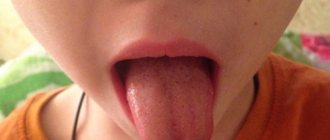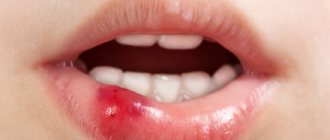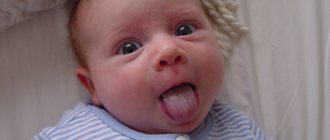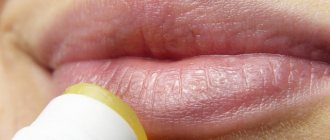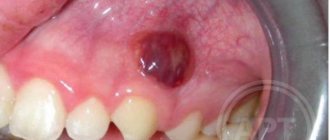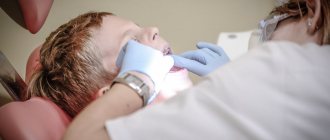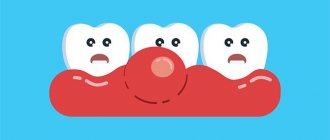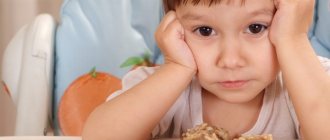Do you often wake up with small sores on your tongue or cheeks? Do you observe the formation of small bumps on the soft tissues in your mouth after eating? In this case, we can talk not about a bad habit, but about the possible development of a chronic disease. Don’t understand why constant cheek biting requires consultation with a specialist, and don’t believe in the serious consequences of ignoring the problem? But in vain, according to statistics, frequent, chronic injuries to the mucous membrane can become a factor in the development of precancerous diseases. In addition to the loss of the aesthetic appearance of the tongue and cheeks, they threaten to deteriorate their overall health.
Main symptoms of cheek and tongue biting
Biting the cheeks or tongue during sleep or while eating is characterized by excessive pressure from the chewing teeth. Because of this, white abrasions first form on the mucous membranes in the mouth (something like a callus). Over time, wounds appear in their place, which bleed, take a long time to heal, and cause pain. As a result, it becomes uncomfortable to talk, brush your teeth, and even eat. When examined by a dentist, such severe damage to the soft tissues in the mouth is diagnosed as an inflammatory process.
A child bit his tongue until it bled - what to do?
If such a nuisance arises, the first thing you need to do is calm down and calm the baby down. Most likely, nothing terrible happened, and the baby is crying from pain and the sight of blood.
The child bit his tongue, it hurts, what to do - first aid rules:
- Stop the bleeding . The tongue has many vessels and nerve endings, so even a minor injury is accompanied by pain and bleeding. Cold will help stop bleeding; encourage your child to rinse his mouth with cold water. To clamp the blood vessels, press a sterile bandage tightly to the wound and hold for 5-10 minutes. Change tampons as needed until bleeding stops completely.
- Disinfect the wound. After rinsing your mouth, treat the wound with an antiseptic. Miramistin is suitable for small children, Chlorhexidine is suitable for older children. You can use a decoction of sage or chamomile for rinsing.
- Eliminate pain . For pain relief, use any gel that is prescribed for difficult teething. Kalgel, Kamistal Baby. If external remedies are not at hand, give Panadol or Nurofen.
- Reduce tongue load . Do not give your child food or water for the first few hours.
What should you not do if your tongue bleeds? Do not apply ice. It is difficult for children to hold the compress motionless, and the effect of extreme cold on the mucous membranes can result in a sore throat or cold. Do not use antibacterial or other potent drugs without a doctor's prescription.
Wounds in the mouth should not be treated with peroxide, iodine, potassium permanganate, brilliant green - all of these agents can cause burns to the mucous membrane. Lidocaine is also not suitable for children; it cannot be swallowed, and this is difficult for children to do.
A sign of wound healing is the appearance of a gray coating on its surface. This is a protective fibrin film.
Causes of tongue biting:
- A bad habit due to nervous tension. Essentially these are uncontrolled movements in stressful situations.
- Bruxism is excessive clenching of the jaws during sleep, during which the jaws move relative to each other and damage the soft tissues in the mouth.
- Malocclusion of teeth, usually due to misalignment of wisdom teeth. The characteristic sideways tilt or rotation changes the shape of the dental arch. This allows the cheek to fit into the gap as the jaws join.
- Poorly performed prosthetics disrupts the correct closure of teeth and makes it possible to capture the mucous membrane during chewing.
- The effect of anesthesia after the removal or filling of teeth is the lack of sensitivity of the cheeks and lips and their increase, which contributes to the biting of soft tissues and the formation of small wounds.
If such symptoms are detected, it is recommended to consult a dentist, who, in addition to examination, in some cases prescribes histological examinations. Sometimes a complete diagnosis also requires consultation with a neurologist.
A child bit his tongue - how to treat it
The mucous membrane quickly recovers, so minor injuries to the tongue do not require special treatment, but you cannot do without medication at all. A few simple rules will help speed up the wound healing process.
What do we have to do:
- Adjust your diet. Eliminate hot and cold foods from the menu. All food should have a soft or liquid consistency. Products that contain vitamin B and C will help speed up the process of mucosal restoration.
- Maintain good oral hygiene . Teach your child to rinse his mouth after every meal, using pharmaceutical or natural antiseptics for this. Brush your teeth and gums twice a day; you do not need to brush your tongue until it heals.
- Strengthen your immune system. Vitamin complexes, rosehip decoction, honey - all these remedies will help to avoid the addition of secondary infectious pathologies.
- Solcoseryl paste . A good medicine with an anti-inflammatory effect, accelerates the process of mucosal regeneration, and prevents the development of secondary infections. Apply to the damaged area 3-5 times a day until complete healing.
- Gel Metrogyl. Contains metronidazole and chlorhexidine, quickly eliminates microbes and manifestations of the inflammatory process. Apply three times a day for a week.
Despite the ban on eating cold foods, you can give your child ice cream. This will reduce the pain a little and lift your mood.
These rules must be followed for 1-2 weeks after the injury.
To reduce the risk of tongue injury, teach your child not to open his mouth, not to stick out his tongue during active games, sports, to be silent and not to rush while eating.
Folk remedies
Alternative medicine methods are safe, have analgesic, antimicrobial and anti-inflammatory effects.
What you can use:
- Aloe juice . It tastes bitter, but promotes rapid healing of ulcers and prevents the appearance of pus. To improve the taste, you can mix it in equal parts with honey and apply it to the injured area 4-5 times a day.
- Salt. Dissolve 1 tsp in 200 ml. regular or iodized salt, use a rinse solution. This product has a pronounced antibacterial and drying effect. It is enough to use it twice a day.
- Soda. Mix a small amount of baking soda with water to make a paste. Apply to the wound 2-3 times a day to eliminate pain and swelling.
- Herbs . Calendula, chamomile and sage are natural antibiotics. Prepare an infusion of 250 ml boiling water and 2 tsp. raw materials, cool to a comfortable temperature. Use as a mouth rinse 4-5 times a day.
For minor tongue injuries, folk methods can be used as independent means of therapy.
How to get rid of the problem of biting your cheek from the inside?
The only sure way to solve such a problem is to quickly contact a professional dentist.
Options for solving the problem:
- Grind and polish the sharp edges of the teeth that touch the mucous membrane;
- Prescribe orthodontic treatment. Mouthguards for bruxism, aligners correcting minor malocclusions. The plate also allows you to reduce the clenching force of the jaws and protects the teeth from rapid abrasion (plates are installed for children under 14 years of age). Install a braces system to correct serious inaccuracies of malocclusion.
- Correction of the location of wisdom teeth or their complete removal.
- Restoration of damaged teeth, removal of old ones, reinstallation of fillings, dentures depending on their location in the jaw.
First aid
If the question arises about what can be done if you bite your tongue, then most likely there is significant damage and severe pain. A small wound heals in a fairly short time and does not bother the person in any way. Deep injuries are accompanied by pain and bleeding.
Tongue biting in children requires urgent medical attention to prevent dangerous consequences. You should not ignore the pain and hope that it will disappear on its own. Due to the child’s undeveloped immunity, an infection can easily penetrate into the damaged tissue and spread further throughout the body through the bloodstream. The doctor will be able to properly treat the wound and prescribe further treatment.
If for one reason or another it is impossible to visit a doctor, you can provide first aid at home. In most cases, at this stage, therapy ends, and further visits to a specialist are no longer required.
If bleeding occurs after biting your tongue hard, you should try to stop it. To do this, use pressure: press the tongue against the palate or gum.
Important! You can reduce the intensity of the inflammatory process and stop the flow of blood using a cold compress. An ice cube from the freezer works great.
To calm the child and reduce the intensity of pain, you can use a lidocaine solution, in which a cotton swab is moistened and applied to the injured area. There is no need to apply too much lidocaine. Otherwise, irritation will occur. In addition, it is necessary to ensure that the child does not accidentally swallow saliva with the drug until it is absorbed into the tissue.
In some cases, stitches are required, which only a specialist can do. Self-medication is not recommended.
Cost of services
| Appointment with a dentist | 260 rub. |
| Grinding and polishing of teeth | 990 rub. |
| Mouthguard for bruxism (1 jaw) | RUB 5,350 |
| Aligners | from 20,000 rub. |
| Bracket system | from 29,150 rub. |
| Tooth extraction, simple | 2,900 rub. |
| Wisdom tooth removal | 7,250 rub. |
| Tooth restoration | RUB 4,950 |
Folk remedies
After you have bitten your tongue, you can begin therapy with folk remedies, from which medicinal decoctions and infusions are prepared:
- salt: 1 tbsp. l. water for 1 tsp. salt, stir and rinse after meals;
- hydrogen peroxide: dissolve soda in water in equal volumes, rinse the mouth with the prepared product after eating;
- milk of magnesia and Benadryl: mix the ingredients in equal parts, rinse the mouth with the prepared product after eating.
You can get rid of a wound with the help of honey, which has an antiseptic effect and helps coat the mucous membrane, thereby preventing its irritation and the proliferation of pathogenic microorganisms. Another natural antiseptic is turmeric in powder form. You can add a pinch of turmeric to honey and apply the mixture on the wound.
Consequences of untimely treatment of frequent tongue biting:
- Formation of a tuberculous ulcer (painful, uneven yellow ulcer);
- Development of leukoplakia (keratinization of the oral mucosa);
- Formation of a cancerous tumor (a compaction in the center of the ulcer that does not heal and can spread to neighboring areas of tissue).
Important! Under no circumstances should you wash open wounds with decoctions or solutions yourself - you risk not only aggravating the pain, but also causing an infection.
Medicines
Only a doctor can tell you how to treat a tongue-biting wound after first aid. As a rule, medications are prescribed to promote rapid healing, eliminate pain and swelling:
- Solcoseryl paste is an excellent drug for getting rid of the inflammatory process, accelerating the regeneration of injured tissues, preventing secondary infections (apply up to 5 times a day to the damaged area until complete healing);
- Metrogyl gel contains chlorhexidine and metronidazole, which effectively cope with pathogenic microorganisms and inflammatory processes (apply up to 3 times a day for 7 days);
- Hydrogen peroxide is a simple and affordable remedy used for wound healing and antiseptic treatment after biting the tongue (dilute with water in equal parts and rinse the mouth up to 2 times a day).
If a child bites his tongue, then compresses with hydrogen peroxide can be applied to the injured area by soaking a cotton swab in the product.
Comprehensive treatment and guarantee of quality results
Dental clinic "VTV" offers a full range of services for the diagnosis and treatment of oral diseases. You undergo a full examination after the first consultation with specialists. Timely treatment allows you to avoid tooth extraction and subsequently prevent the recurrence of the disease.
We offer comfortable conditions for treatment and guarantee flexible prices for all center services. In particular, you can save now by making an appointment through the website with a 10% discount. Our specialists will do everything to make your smile your next pride!
When to see a doctor
Parents can usually eliminate the negative consequences of tongue biting themselves. But in some cases you cannot do without medical help.
Dangerous symptoms:
- the wound bleeds heavily, bleeding continues for more than 15 minutes;
- the damaged area has swollen, an extensive hematoma has formed;
- the size of the wound on the tongue is more than 5 mm, it is quite deep, or has uneven edges;
- pus appeared at the site of injury;
- the child bit through his tongue or bit off the tip;
- painkillers do not help;
- the tongue is swollen, there are seals on the surface;
- blue lips, convulsions are signs of painful shock;
- deterioration of general condition – fever, weakness;
- the wound does not heal for more than 4 days.
In such situations, the doctor will tell you how to treat the tongue. You may need to consult a traumatologist, dentist, or maxillofacial surgeon.
Without proper and timely treatment, serious complications can occur - extensive hematomas, infection of the tongue muscles, and the development of speech defects.
Pathogenic microorganisms enter the wound, which is fraught with the development of bacterial and viral pathologies.
